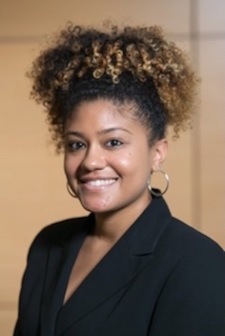 |
|
| Ciearra Smith, PhD candidate |
The Society for Neuroscience has named Graduate School of Biomedical Sciences student Ciearra Smith a Neuroscience Scholar. One of only 15 students nationwide selected for the prestigious fellowship, Smith is researching genetic underpinnings of nicotine dependence and withdrawal in the lab of Paul Gardner, PhD.
“I’ve always been interested in the molecular mechanisms underlying diseases,” said Smith, who was originally interested in cancer biology. “The disease we study is nicotine addiction.” Interestingly, the Gardner lab has previously associated the genes she is studying with lung cancer.
Smith employs molecular biological approaches combined with behavioral studies to study the brain’s nicotinic acetylcholine receptors, which nicotine, the addictive component of tobacco, binds to and activates. Notably, she is pioneering use of the state-of-the-art gene editing technique CRISPR to study the regulation and effects of a specific nicotinic acetylcholine receptor gene.
“If it works I can take this technique and use it in different models and different diseases,” she noted.
The society is the world’s largest organization of scientists and physicians devoted to understanding the brain and nervous system. The Neuroscience Scholars Program provides neuroscience trainees from underrepresented and diverse backgrounds with career development and networking opportunities to help them reach their career goals. The two-year training program provides annual travel awards for attendance at the society’s annual meeting and other professional development activities; structured mentoring; live events and webinars; a rich library of educational resources, and an online diversity affinity group for career connections and guidance.
“This is a terrific honor for Ciearra and UMass Medical School. A long-term goal of Ciearra’s research is to identify novel targets for smoking cessation therapeutics,” said Dr. Gardner, professor of psychiatry and associate director of the Brudnick Neuropsychiatric Research Institute. “Her results should pave the way for translational studies in the future.”
The Maryland native first engaged in laboratory research as a biology major at North Carolina Agricultural and Technical State University. Her mentors there encouraged her to apply for a Maximizing Access to Research Careers Undergraduate Student Training in Academic Research award. The National Institutes of Health sponsors MARC U-STAR awards to provide support for undergraduate students from backgrounds underrepresented in the biomedical sciences to improve their preparation for doctoral training.
“I’ve wanted to be a scientist since I was 7,” Smith said. “I’ve had a lot of influential people in my life, amazing mentors who really pushed me to be the best scientist I could be and pursue a PhD.”
She also took advantage of opportunities to conduct research at Johns Hopkins University during the summer of 2012, and became familiar with the GSBS as a member of the UMMS Summer Undergraduate Research Class of 2011. These experiences helped mold Smith’s scientific aspirations and led to her 2013 entry to the GSBS, where Brian Lewis, PhD, has also served as a mentor. Dr. Lewis, associate dean for diversity and prematriculation programs and associate professor of molecular, cell & cancer biology, apprised Smith of the SFN opportunity via the Diversity Interest Group and the Initiative Maximizing Student Development at UMMS.
During her fellowship, Smith will have a mentoring team consisting of a senior mentor, a peer mentor, and a member of the Diversity in Neuroscience Subcommittee with whom she can discuss her research and career plans. The overall experience will support her as she completes her dissertation research.
In addition to pursuing her scientific aspirations, Smith actively promotes diversity at UMMS. Recently elected co-chair of diversity for the Graduate Student Body Committee, she will work closely with the GSBS Center for Biomedical Career Development. Her future goals include a postdoc and teaching at a historically black college to promote women and minorities in science.
“I’m really big on giving as well as receiving mentoring,” she said. “This aspect, as well as exposure to conferences and peers, drew me to the Neuroscience Scholars program.”
Related stories on UMassMedNow:
Neuroscientists identify brain circuitry responsible for increased anxiety in smokers trying to quit
Three genes, double trouble for nicotine addiction and lung disease
NIH Initiative for Maximizing Student Development funds UMMS program